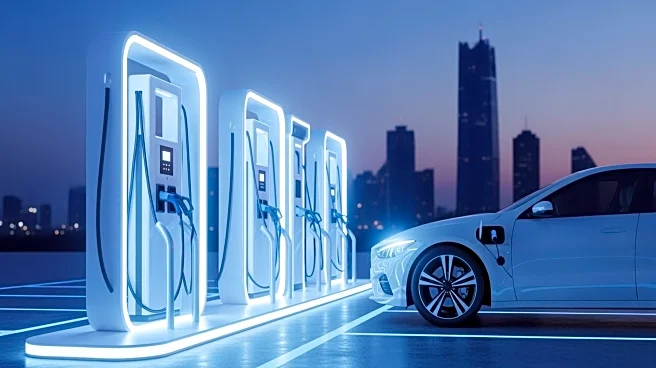What's Happening?
Volkswagen Group has reported a significant increase in its battery electric vehicle (BEV) sales for 2025, with a 42% rise compared to the same period in 2024. By the end of September, the company delivered 717,500 BEVs, up from 506,600 in the previous
year. This growth is attributed to strong sales in Europe and the United States, with an 85% increase in the U.S. market. The Volkswagen Group, which includes brands such as Volkswagen, Audi, Porsche, Skoda, and Seat, has also seen a 55% increase in plug-in hybrid vehicle (PHEV) sales, totaling 299,000 units. The top-selling BEVs for the group include the Volkswagen ID.4/ID.5, Volkswagen ID.3, and Audi Q4 e-tron.
Why It's Important?
The surge in Volkswagen Group's BEV sales highlights the growing consumer demand for electric vehicles, particularly in the U.S. and European markets. This trend is significant as it underscores the shift towards sustainable transportation solutions and the increasing competition in the electric vehicle sector. Volkswagen's success in expanding its market share in the U.S. could influence other automakers to accelerate their electric vehicle offerings. The company's leadership in the European BEV market, with a 27% market share, further solidifies its position as a key player in the global transition to electric mobility.
What's Next?
Volkswagen Group's continued investment in electric vehicle technology and infrastructure is likely to drive further growth in BEV sales. The company plans to launch new electric models, which could enhance its market presence in China, where sales have declined. The increasing demand for plug-in hybrids and BEVs suggests that Volkswagen will focus on expanding its product lineup to meet diverse consumer preferences. The company's strategic moves could prompt responses from competitors, potentially leading to more innovation and competitive pricing in the electric vehicle market.
Beyond the Headlines
The rise in BEV sales by Volkswagen Group may have broader implications for environmental policy and automotive industry regulations. As electric vehicles become more prevalent, there could be increased pressure on governments to support infrastructure development, such as charging stations, and to implement policies that encourage the adoption of clean energy vehicles. This shift could also impact the oil industry, as reduced demand for fossil fuels may lead to changes in energy markets and geopolitical dynamics.














